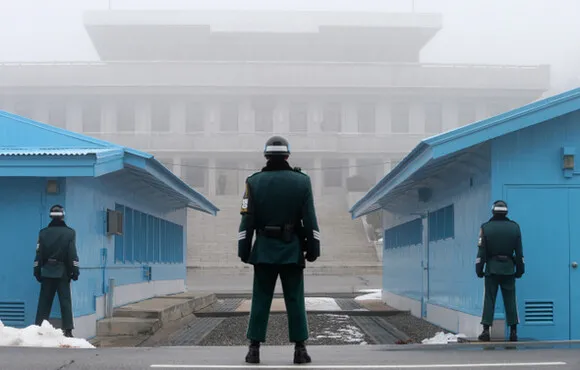hankyoreh
Links to other country sites 다른 나라 사이트 링크
North Korea cannot unilaterally nullify Armistice agreement

By Kim Kyu-won, staff reporter
In principle, the 1953 Armistice agreement that ended combat in the Korean War cannot be amended or abandoned by any one of its three parties - the UN, North Korea, and China. But no realistic means exist to stop one of them from unilaterally violating it.
The agreement consists of five parts. Article I is an article on the Military Demarcation Line (MDC) and Demilitarized Zone (DMZ), article II concerns special steps for a cease-fire and armistice (cessation of hostilities), article III has to do with prisoners of war, article IV lists proposals for the two governments, and article V is a list of supplementary provisions. Articles I, II and V are in question when North Korea unilaterally decides to pull out.
First of all, by disavowing the armistice agreement North Korea is refusing to abide by the terms in Article 1 on the MDC and DMZ. The MDC was drawn in 1953 between zones that were occupied by the UN forces on one side and North Korea and China on the other. By moving the forces two kilometers back on either side, the agreement created a DMZ measuring 4km across. So North Korea’s refusal to recognize the line and zone means that it is not acknowledging the territory or government of the two countries. This could be taken to mean that it might attempt a military invasion of South Korea at any time.
In and of itself, the disavowal of article II means that North Korea could resume acts of war. It states that, “The commanders of the opposing sides shall order and enforce a complete cessation of all hostilities in Korea by all armed forces under their control, including all units and personnel of the ground, naval, and air forces.” In refusing nullifying it, North Korea opens up the possibility of making an unannounced shift from armistice to hostilities and attacking South Korea.
Article II also bars North and South Korea from bringing in soldiers or weapons from outside their territory. If North Korea does not recognize its terms, it opens the way for it to do just that. The same article also includes provisions on the makeup, responsibilities, and authority of the Military Armistice Commission and Neutral Nations Supervisory Commission, which suspended their activities in 1991 after objections from Pyongyang. The disavowal of the agreement is also a repudiation of those organizations.
Finally, the miscellaneous provisions in Article V state that any amendments to the agreement must be agreed to by the two sides’ commanders and that the terms will remain in effect until a peaceful settlement is reached. These provisions likewise lose force with North Korea’s unilateral decision to pull out.
The agreement was signed on July 27, 1953, by UN commander Mark Clark, (North) Korean People’s Army commander Kim Il-sung, and Chinese People’s Volunteer Army Commander-in-Chief Peng Dehuai. South Korea was not a party to it, having ceded operational command to the UN Command early on in the Korean War.
Please direct questions or comments to [english@hani.co.kr]

Editorial・opinion
![[Editorial] Abandoned appeal in 2019 lawmaker clash case raises questions about prosecutors’ standards [Editorial] Abandoned appeal in 2019 lawmaker clash case raises questions about prosecutors’ standards](https://flexible.img.hani.co.kr/flexible/normal/500/300/imgdb/original/2025/1128/1817643173126142.jpg) [Editorial] Abandoned appeal in 2019 lawmaker clash case raises questions about prosecutors’ standards
[Editorial] Abandoned appeal in 2019 lawmaker clash case raises questions about prosecutors’ standards![[Column] The origins of China’s real estate bubble [Column] The origins of China’s real estate bubble](https://flexible.img.hani.co.kr/flexible/normal/500/300/imgdb/original/2025/1127/3717642304508069.jpg) [Column] The origins of China’s real estate bubble
[Column] The origins of China’s real estate bubble- [Editorial] Was Yoon’s wife pulling the strings of those investigating her?
- [Column] Has Korean society become any safer since the martial law crisis?
- [Column] Japan’s quandary in the ‘new type of great power relations’
- [Editorial] Yoon proves himself a coward and a fool in court
- [Column] A prospect more worrying than a Korean Peninsula sans US
- [Column] There’s no solving the feud between Japan and China
- [Correspondent’s column] Goodbye MAGA, hello affordability?
- [Editorial] PPP lawmakers get slap on the wrist for violent violation of legislative procedure
Most viewed articles
- 1What’s really driving the drastic depreciation of Korea’s won
- 285% of major Korean firms say political uncertainty could fuel exchange rate woes
- 3Korean industries reeling on surging won-dollar exchange rate
- 4Korea sinks further into trade deficit with China amid inaction from government
- 5Won’s real effective exchange rate plummets to lowest level since 2009 financial crisis
- 6S. Korea, China renew their currency swap for additional five years to an increased US$59 billion
- 7[News analysis] The double-sided nature of South Korea’s growing diplomatic influence
- 8Korea records first trade deficit with China since 1992
- 9[Column] A prospect more worrying than a Korean Peninsula sans US
- 10Korea more vulnerable than most to demand shocks from US and China, report finds